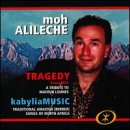| All Artists: Moh Alileche Title: Tragedy Members Wishing: 0 Total Copies: 0 Label: Flag of Freedom Original Release Date: 6/16/2000 Re-Release Date: 4/11/2000 Genres: Dance & Electronic, International Music, Pop Style: World Dance Number of Discs: 1 SwapaCD Credits: 1 UPC: 659057066523 |
Search - Moh Alileche :: Tragedy
 | Moh Alileche Tragedy Genres: Dance & Electronic, International Music, Pop
|
Larger Image |
CD Details |
CD ReviewsÇa me rappelle les montagnes de Kabylie en Afrique du Nord. M. Daoud | San Francisco, California | 11/14/2001 (5 out of 5 stars) "J'ai beaucoup aimé ce CD. Moh Alileche est en demande dans les salles californiennes où il se produit assez souvent. Il chante aussi dans sa ville a Berkeley (Californie) et dans la région de la Baie de San Francisco en public et gratuitement. Ce sont des chansons engagées et aussi poétiques. Parfois mélancoliques, parfois pleines d'espoir. Mais toujours sincères." Algeria's Joy & Troubles From Amazigh (Berber) Perspective Mitch Ritter | Po' Land, Or-Wa USA | 11/08/2001 (4 out of 5 stars) "Naming the CD Tawaghit/Tragedy seems like a depressing way to signal one's attachment to their native land. Alileche, however, is celebrating the natural joys of Algeria every bit as much as he is acknowledging its tragic present state. Translations in Alileche's handsome CD booklet from the 3000 year old native north African language of Tamazight (no it is not a corruption of Arabic which only arrived with the Islamic conquest and conversion of historically multi-cultural Tamazgha, or Land of Free Peoples) are in English thankfully, as most Amazigh (Berber) music that reaches the Anglo world carries only a few French words, if anything at all about the highly developed oral literature of Amazigh bards. Arabophone Algerian Rai & Chaabi musicians whose work Sting releases i.e. Hakim, Khaled, & Cheb Mami party on relentlessly, waxing silent on the 180,000 countrypeople who have been massacred since 1992 by either Islamist militias or the so-called secular Generals known as Le Pouvoir, who hijacked the 1962 revolution led by Amazigh fighters in Alileche's native Kabylia region of Algeria. Alileche's own father was executed by the French before they were forced out.The opening title track is in fact dedicated to Amazigh human rights singer Lounes Matoub, who in 1998 was gunned down upon his return to Kabylia from exile with his sardonic new CD "ALGERIASSIC PARK/LETTRE OUVERTE." Alileche's voice and the resonant timbre of the Tamazight language with many soundclusters not made by any other linguistic family, carries a parallel world of senses brought to life from the numbing horrors. Alileche plays a nimble mondol, a 10-stringed instrument descended in classical Mediterranean history from the ancient Greek lyre. Mimi Spencer adds the missing qanun parts she learned from listening to Lounes Matoub records, and Susu Pampanin and Heni Hached add darbouka as well as other north African percussive touches.If the opening track is this thoughtful album's soul, its heart is the middle portion featuring an almost Dylan-esque summation of what we don't get on the evening news in "Algeria's Troubles," followed by "Trust No More" and an uplifting "Day of Happiness" with melodic counterpoint from north African banjo master Omar Ait Vimoun. These 3 songs could be played on any World or Acoustic Music radio program and light up the switchboards from enchanted listeners even without the translated words being read over the air. But when the translated words were read over the air one night on New York City's WBAI (99.5 FM) by the Moorish Radio host, this rabbit's hole parallel universe of nearest, yet, invisible and inaudible Africa opened up to our otherwise distracted Anglo American world."
|

 Track Listings (9) - Disc #1
Track Listings (9) - Disc #1